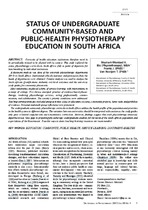| dc.contributor.author | Mostert-Wentzel, K. | |
| dc.contributor.author | Frantz, Jose M. | |
| dc.contributor.author | Van Rooijen, T. | |
| dc.date.accessioned | 2014-10-22T13:43:18Z | |
| dc.date.available | 2014-10-22T13:43:18Z | |
| dc.date.issued | 2013 | |
| dc.identifier.citation | Mostert-Wentzel, K., Frantz, J. & Van Rooijen, T. (2013). Status of undergraduate community-based and public-health physiotherapy education in South Africa. South African Journal of Physiotherapy, 69 (1): 1-10 | en_US |
| dc.identifier.issn | 0379-6175 | |
| dc.identifier.uri | http://hdl.handle.net/10566/1267 | |
| dc.identifier.uri | http://dx.doi.org/10.4102/sajp.v69i1.369 | |
| dc.description.abstract | Curricula of health education institutions therefore need to
be periodically revised to be aligned with its context. This study explored the
status physiotherapy curricula in South Africa (SA) as point of departure for
benchmarking by individual institutions.
A document analysis was done of the university physiotherapy departments
(N=8) in South Africa. Institutional ethical clearance and permission from the
heads of departments were obtained. Content analysis was used to analyse the
South African Qualifications Authority exit-level outcomes and the university
study guides for community placements.
Most universities employed a form of service-learning, with interventions in
a range of settings. Five themes emerged: practice of evidence-based physiotherapy,
rendering physiotherapy services, acting professionally, communication,
and collaboration. The country’s priority conditions were addressed.
Teaching-earning strategies included group activities (class or education sessions), community projects, home visits and portfolios
of evidence. Personal and small-group reflections were prominent.
The undergraduate community physiotherapy curricula in South Africa address the health profile of the population and priorities
in the health system to different degrees. The variation between universities should be interpreted with caution as the study guides
only gave a limited snapshot into each institution’s curriculum. However, findings suggest that each physiotherapy university
department may have gaps in preparing physiotherapy undergraduate students for the needs of the South African population and
expectations of the Government. Possible ways to share teaching-learning resources are recommended. | en_US |
| dc.language.iso | en | en_US |
| dc.publisher | SA Society of Physiotherapy | en_US |
| dc.rights | This is an open access journal which means that all content is freely available without charge to the user or his/her institution. Users are allowed to read, download, copy, distribute, print, search, or link to the full texts of the articles, or use them for any other lawful purpose, without asking prior permission from the publisher or the author. This is in accordance with the Budapest Open Access Initiative (BOAI) definition of open access. Learn more about the journal copyright, licensing and publishing rights. | |
| dc.subject | Education | en_US |
| dc.subject | Community | en_US |
| dc.subject | Public health | en_US |
| dc.subject | Service learning | en_US |
| dc.subject | Document analysis | en_US |
| dc.title | Status of undergraduate community-based and public-health physiotherapy education in South Africa | en_US |
| dc.type | Article | en_US |
| dc.privacy.showsubmitter | false | |
| dc.status.ispeerreviewed | true | |
| dc.description.accreditation | Department of HE and Training approved list | en_US |

